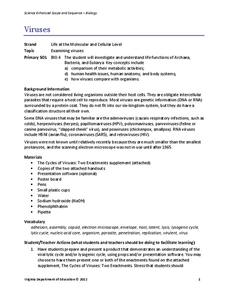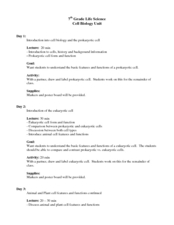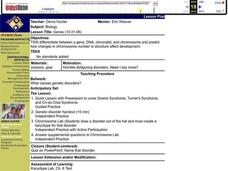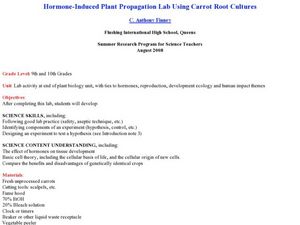Curated OER
Designer Babies
Students differentiate phenotypes and genotypes. In this genetics lesson, students complete the punnett square. They design their own baby by choosing the phenotype they want.
Curated OER
Genetics and Heredity: The Next Generation
Tenth graders work in teams to order events of DNA transcription and translation protein synthesis. In the second lesson, they put the steps of mitosis and meiosis in order using a concept map poster. They use modeling clay to create...
Curated OER
Plant Biotechnology: Controlling Tissue Differentiation
Learners demonstrate hormonal control of plant tissue differentiation and relate this differentiation to gene expression. They explore the effects of hormones (auxin and cytokinin) on the genes that control tissue differentiation in callus.
Howard Hughes Medical Institute
The Molecular Evolution of Gene Birth and Death
An upper-level biology activity, the comprehensive worksheet found here accompanies a PowerPoint and the video The Making of the Fittest: The Birth and Death of Genes, both of which are linked to through the website. Depending on the...
Curated OER
Development in Drosophila melanogaster
Learners study the least familiar aspect of development in Drosophila melanogaster; the development of the pupa. Students isolate and culture "First-day" pupae. They are dissected daily to study the progressive developmental changes.
Curated OER
Comparing Chimp mtDNA to Learn about Races
In this computer-based activity, students will measure genetic diversity within and between three subspecies of chimpanzees in order to gain a better understanding of genetic distinctiveness and explore race as a genetic concept.
Curated OER
They're more evolved that way
Students explore the notion of local evolution, or genetic selectivity among different continent-based human populations. They consider specific examples of local evolution, such as lactose tolerance, skin color, and cognitive capacity,...
Virginia Department of Education
Viruses
Germs, parasites, and viruses, oh my! Facilitate a instructional activity on viruses as individuals explore functions of Archaea, Bacteria, and Eukarya. They learn how viruses compare with other organisms in nature and how they...
Curated OER
Ghost in Your Genes
High schoolers explore DNA microarrays. In this genetics lesson, students model DNA microarrays that are used by scientists. High schoolers work to determine levels of breast cancer genes in patients. They will determine the treatment...
Curated OER
Cell (Biology)
Students conduct a series of activities to explore the nature of cells. In this biology lesson, students observe plant and animal cells under the microscope and compare them. They differentiate osmosis and diffusion.
Curated OER
It's Alive! Using Microorganisms in Cooking
Learners create a KWL chart about food. In this chemistry lesson, students differentiate physical and chemical changes. They explain how microorganisms are used in food preparation.
Curated OER
Human Cloning: Is it Biological Plagiarism?
Is cloning good or harmful? Help your class understand the risks and benefits as they read, research, and discuss human cloning. Individuals form teams, research information, and present to the class before concluding with an in-depth...
Virginia Department of Education
Adaptation and Evolution
Um may be the atomic symbol for confusion, but it won't be needed in this lesson. Scholars rotate through seven stations completing experiments, hands-on activities, writing exercises, and analysis. Stations include material on...
Odell Education
Plant and Animal Cells
Incorporate multiple facets of the cell into your next high school lab! Through an introduction to cell organelles, class members observe each cell type and draw visuals to further demonstrate understanding of cellular processes in both...
Virginia Department of Education
Cell Division
Searching for simple ways to teach mitosis to high schoolers? Using colored chalk and onion root tips, pupils visually demonstrate what they view when looking through the lens of a microscope. There are also various ways to expand the...
Curated OER
How Things Go Wrong
Students identify where mutations might occur and examine what effect those mutations will have through class discussion of DNA replication and cell division. Students then differentiate between mutations that affect individuals and...
Curated OER
What Is Cloning?
Students differentiate between reproductive and therapeutic cloning and then use research, discussion, and writing in journals to examine their own personal opinions on these subjects.
Curated OER
Karyotype Puzzle
Students identify chromosome pairs based upon band patterns and location of centromere. They order chromosome pairs based upon size. Students differentiate normal karyotypes from abnormal karyotypes. They correctly record karyotype...
Curated OER
Plant Biotechnology: Controlling Tissue Differentation
Learners demonstrate skills of biotechnology stringent aseptic technique and statistical analysis. They describe hormonal control of plant tissue differentiation and relate this to gene expression. Students observe the effects of...
Curated OER
Mitosis and Meiosis
Students model and differentiate between the processes of mitosis and meiosis. In partners, they use yarn and construction paper to create models for each of the phases of mitosis and meiosis then compare the chromosome numbers in each...
Curated OER
Genes
Students discuss the difference between a gene, DNA, chromatid, and chromosome. They predict how changes in chromosome number or structure affect development. Students discuss what causes genetic disorders. They view a PowerPoint that...
Curated OER
Hormone-Induced Plant Propagation Lab using Carrot Root Cultures
Students evaluate the importance of hormones in living things. In this biology activity, students experiment on carrots to differentiate how humans and plants reproduce. They collect data from experiment to answer analysis questions.
Serendip
Evolution of Fur Color in Mice – Mutation, Environment and Natural Selection
Most species of animals include a variety of fur or hair color, but why? Scholars watch a video about a changing environment for mice. As the rocks around them change hues, different colors of mice begin to thrive. Discussion questions...























